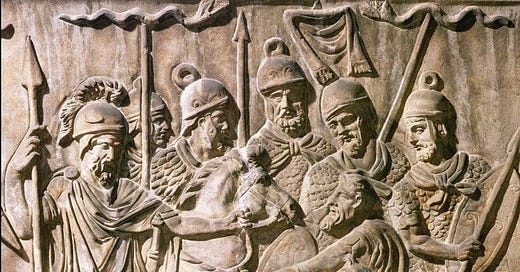Tacitus is one of Rome’s most well known and celebrated historians, and this not without good reason. He is a clear communicator, has a winsome style of writing, and he is not overly prejudiced in favor of his own people when recording his histories. If anything, he often uses the example of foreign peoples to shame his fellow Romans who were not living upright nor following the paths of virtue. Tacitus clearly had an appreciation for the good life and he was quick to praise it wherever he saw it. He despised vice and the abuse of power and he was wont to expose these whenever he could.
This tendency to praise virtue and blame vice, even using the example of other nations and peoples to shame his fellow Romans, is on full display in his short work Germania. The Germani people are those whom the Romans would have called “barbarous,” and this not entirely without reason. The Germani did not live in large communities (certainly nothing like a city), they lived in rough huts of ugly construction, they kept their idols in the woods rather than beautiful temples, their children ran around naked and dirty until they reached maturity, they didn’t have refined food, music, or art, and they could be incredibly savage in battle. Nevertheless, Tacitus finds much to admire about this people even in the midst of their lack of civilization.
One of the things which seems to most impress Tacitus about the Germani is their view of marriage and family. He writes, “Marriage there is very strict, and no feature of their culture deserves higher praise.” He tells us that the men respect the women and value their council. Further, he appreciates their chastity, writing, “There is no pardon for a woman who prostitutes her chastity; neither by beauty nor youth nor wealth can she find a husband. No one finds her vice amusing…” He respects the fact that children, although poorly dressed and dirty, are valued and that “To restrict the number of children or to put to death any born after the first is considered criminal.” He adds to this statement that “Good morality is more effective there than good laws elsewhere.”
Tacitus seemed to believe something, and the Germani seemed to know something, that our modern western society has forgotten, namely, that “the children reflect the might of their parents” and “The larger a man’s kin and the greater number of his relations by marriage, the stronger his influence when he is old; childlessness has no reward.” Family is the most important building block of society and it is something that should matter to each of us more than almost anything else.
The Romans were the picture of peak civilization in the ancient world. Even by our standards today the Romans tend to outstrip us in many ways in their art and architecture, but Tacitus was well aware that their great successes had made them decadent and caused them to forget certain things about virtue and those qualities which make a people strong. They forgot that which would have been far better to remember. The Germani may have been a savage enemy and a real threat to the security of Rome, but their example on certain fronts offered Rome a better path than that which many of the elite of Rome had been choosing in Tacitus’ own day. Marriage, fidelity, children, piety, these were the lessons the Germani had to teach and Tacitus was glad to pass on the message.
In this short work you will get to know a little more about the uncontrollable wild men of the north whom Rome never quite managed to subdue. You’ll learn about the geography of their land, the climate, what they wore (or didn’t), what their diet was like, and how they governed themselves, etc. It’s a great, short, and easy read from one of Rome’s best and a perfect companion to his other short work Agricola which tells us of another Roman frontier, Britannia. So, take up, read, and enjoy!
Below you will find links to each section of the study guide for Tacitus’ Germania as they become available. If you would like to pick up a copy of the book to join in the study you may do so by clicking HERE. To see a list of other Great Books study guides already available, in development, or planned for the future you can click HERE.
A PDF version of this study with lots of extras is available to Paid Subscribers!



